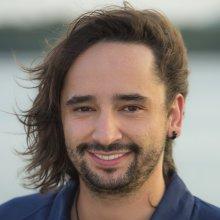
Juan Sebastian Mayorga
Tell us about your work / research. What kinds of things do you do?
I specialize in marine conservation and fisheries management with a strong focus in Marine Protected Areas. In my work I use marine ecology, economics, and policy analysis to inform and guide decision making processes around marine reserves in many parts of the world. For example, a recent and successful project in collaboration with National Geographic Pristine Seas led to the creation of the Darwin and Wolf Marine Sanctuary in Galápagos Ecuador.
What sparked your initial interest in your career?
I've been fascinated with the ocean and obsessed with sharks ever since I was a kid. However, growing up in Bogota, Colombia I had little exposure to the ocean. My passion was sparked by watching TV shows of explorers and scientists diving and working in incredible places. As I was pursuing my undergraduate degree in environmental engineering I became aware of the ever increasing pressures that we are having on our oceans and that are putting at risk those incredible places I saw on the TV as a kid. Then when I graduated I decided to turn around my career and leave Bogota in pursue of a big dream: to become a leader in marine science and conservation and make a difference in the way we manage our oceans.
Who influenced you or encouraged you the most?
The most influential experience that encouraged me to follow this career path was a 3500 nautical mile research cruise in the pacific onboard a 135 foot brigantine. For 14 weeks, we sailed from Tahiti to Hawaii doing field oceanography, learning to sail, and to navigate with the stars. I fell in love with life at sea and committed to dedicate my life to the exploration and conservation of our oceans.
What element of your work / study do you think is the most fascinating?
The most fascinating part of my work is the interdisciplinary approach we take to problem solving. Is really incredible when data scientists, economists, ecologist, and policy-makers sit together to think about solutions to a problem in marine conservation and resource management.
What other jobs led to your current career?
I've had multiple and diverse work experiences and project that have uniquely contributed to my current career. The list includes with remote sensing of the ocean, marine renewable energy, field oceanography, and economic valuations of sharks. I'm a firm believer in interdisciplinarity and unity of knowledge across multiple fields. Is the only way to tackle the complex problem our oceans are facing.
What are your degrees and certifications?
Bachelor of Engineering in Environmental Engineering - Universidad de Los Andes, Bogota, Colombia 2014;
Masters in Environmental Science and Management - University of California, Santa Barbara, 2016
What are your hobbies?
I'm passionate about scuba diving and underwater photography. I try to get underwater as much as I can.
What advice would you give to someone who wants to have a career like yours?
If you want to get into marine science and exploration then be courageous, curious, determined, and have grit and perseverance. Is an arduos road but one worth taking. We need you!
How did you get involved in the Nautilus Exploration Program? How did you get on the ship?
I applied for the Ocean Science & Seafloor Mapping Internship and joined the ship on the Galápagos expedition in 2015. At that time I was in the middle of the Galápagos project so the internship was a perfect opportunity to complement and enhance my research.
Learn more about my work: http://jsmayorga.com/
" I am thrilled and honored to sail aboard the Nautilus and contribute to the exploration and understanding the world’s oceans. I want to become a leader in marine science and conservation, and inspire young generations in the same way that Dr. Ballard and many other explorers and scientists have inspired me"
Expeditions
Juan Sebastian participated in the following Ocean Exploration Trust expeditions:
